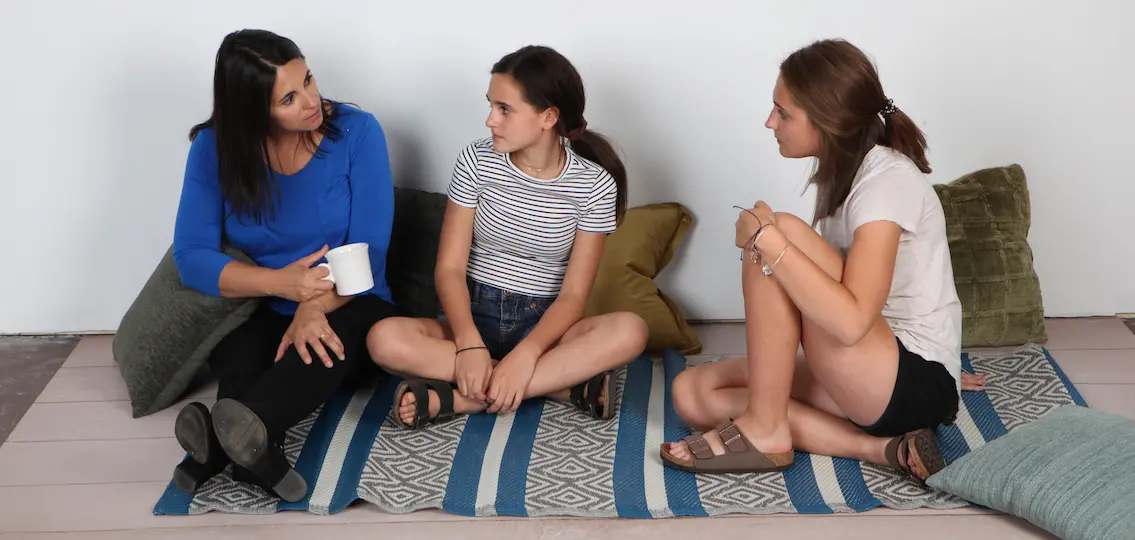Picture this scenario: you drop your kid off at school for some event he only told you about that morning (which turns out to be some kind of award ceremony that other parents are walking into with grandparents and cameras). You stand with other parents feeling exasperated that your teenager tells you nothing—about school, their grades, friends’ last names, inner psychological landscape.
You complain, “I have no idea what’s going on in his life.”

The other parents nod sympathetically. They too admit they have no clue about 95% of their teen’s waking hours.
One mother always emerges from the crowd. “Katie and I are very close,” she will claim earnestly. “She tells me everything and we have such great long talks together.”
Oh.
Now you’re embarrassed that you’ve exposed your terrible parenting in public. And this woman’s boast reinforces your growing paranoia about what your secretive, crafty teen is up to. What are you doing wrong as a parent that your kid tells you nothing?
That mother used to make me snort with derision. When your sisters-in-arms are complaining about their kids, you’re supposed to commiserate, not brag about your perfect darling. Now that I’m a grizzled veteran, however, I’m just wryly amused.
And I’m here to tell you this: any parent who thinks their teen tells them everything is either lying, or embarrassingly, naively clueless.
How do I know this? Well, how much did you tell your parents when YOU were a teen? Exactly.
Teens never tell their parents everything. Or what they DO tell you is completely sanitized so you don’t learn anything truly informative or alarming that might spur you into taking actions that would only mortify them. When you talk to teens, it’s simple self-preservation.
Here’s the real truth: expecting that your kids tell you everything is unhealthy and counterproductive.
I wasn’t always this low-key, discreet, cool mom.
I used to be the sort that put the word “mother” into “smother.”
Once my daughter told me she had met someone she liked named Justin and the name of the school he attended. When I asked her Justin’s last name was, she demurred, saying, “You’ll just try to find out and it’s not that big a deal.” That kind of cagey secrecy was like a personal challenge to me. After only seven minutes on Google, I had ferreted out that Justin was a swimmer, had won his schools’ outstanding history student award, his dad’s profession, and that he had done really well in the school’s quiz bowl competition. It wasn’t even sporting, it was so easy.
And like the velociraptors in “Jurassic Park,” my teenagers learned and adapted. They became increasingly stealthy, evasive, and selective in their communications, until I was on a bare minimum, need-to-know basis only.
My teenagers became secretive because I was nosy and intrusive. The more I pried, the more they clammed up.
Somehow I had made my kids’ lives about me. I told myself, “I’m a good mother because I have forced my way into every single nook and cranny of my kids’ brain space.” That isn’t love—it’s narcissism. Because it was not all about me. My kids are entitled to their own lives separate and apart from me. It’s good for them to have some privacy and agency over their own lives.
I did not have a proprietary right to know everything. Besides, when they needed me, they let me know.
And while I’m ranting, we parents must stop using cell phones like the world’s longest umbilical cords. Just because you have the technology to reach your teenager 24/7 does not mean you should. We do crazy things like texting them when you know they’re in class, and demanding that they respond instantly (yes, I’ve done that).
Reality check: in college, I didn’t talk to my parents more than twice a month. When I spent a semester abroad, weeks went by where I was studying, traveling, living my life and maturing into adulthood without being bombarded by, “When are you going to be home? Do you have any tests you should be studying for? How was school today?” Our kids deserve that space, too.
I understand now why they didn’t tell me everything. They had to learn how to deal with difficult situations themselves, like the roommate who wanted the room to “entertain” a new friend at 2 a.m., or the roommate that smoked weed in the room, skipped class, and watched Netflix all semester. And they did. That means we did our job as parents well and successfully launched functioning, healthy young adults. Well done, us.
So don’t feel bad when that mom pretends she is still omniscient about her 17-year-old BFF, bless her heart. Rejoice—you’re giving your kid some healthy space.

And someday your kids will tell you a lot of fun stories. Like how your daughter’s roommate last year was a practicing Wiccan with an altar in their room (true story), or that your son’s university assigned housing for him with two female roommates which he was perfectly cool with for two weeks until Student Housing straightened it out (true story). And when they do, you’ll be able to smile and shake your head, instead of freaking out. They figured out what to do, handled it, and moved on. Well done, all of us.




